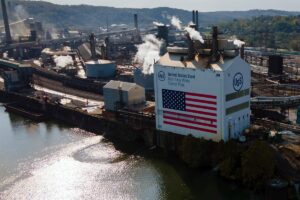U.S. Steel Hits 52-Week High Amid Renewed National Security Review
Shares of U.S. Steel have surged, reaching a notable 52-week high, following President Donald Trump’s recent directive for a national security review of Nippon Steel’s proposed $15 billion acquisition of the iconic American steelmaker. This led to a remarkable 16% increase in U.S. Steel’s stock price on Monday, with modest gains continuing into Tuesday.
The backdrop for this transaction is complex, as President Joe Biden blocked the acquisition just before exiting office, echoing Trump’s previous commitments to take a stand against foreign ownership of key American companies. Late Monday, Trump instructed the Committee on Foreign Investment in the United States (CFIUS) to conduct a thorough assessment of the deal, focusing on potential national security risks.
Behind the Scenes of the National Security Review
The CFIUS review will provide a detailed examination of the proposed deal’s implications on national security, with the U.S. government allowing both Nippon Steel and U.S. Steel time to address any concerns raised during this confidential review. This process is critical, as CFIUS is tasked with submitting its recommendations to Trump within 45 days, detailing whether the proposed mitigative measures by Nippon and U.S. Steel are sufficient to alleviate identified risks.
Adding to this unfolding saga is Ancora Holdings Group, which holds a minority stake in U.S. Steel. The firm has expressed its non-opposition to Nippon’s bid but has also urged U.S. Steel to postpone its upcoming annual shareholder meeting, originally scheduled for May 6. Ancora advocates for a delay until after June 18, ensuring shareholders are informed of the review outcome before making significant decisions.
The Political Landscape
This acquisition bid has become a focal point in the run-up to the 2024 presidential election, with significant implications for the politically crucial state of Pennsylvania. Biden’s administration aligned with the United Steelworkers union to block the acquisition, underscoring concerns that jobs could be slashed and existing labor agreements disregarded. In contrast, Trump has publicly opposed the sale, framing the issue as vital for protecting American industry.
Interestingly, CFIUS had provided Biden with a report on potential national security risks associated with this transaction late last year, but the panel failed to reach a consensus on whether significant risks were present. In February, Trump suggested that Nippon Steel might back away from the acquisition but indicated a willingness for the Japanese firm to invest in U.S. Steel instead, reflecting the delicate balance of domestic and foreign interests.
Legal and Financial Ramifications
The complexities surrounding this deal have not gone unnoticed, as Nippon Steel and U.S. Steel swiftly filed a federal lawsuit challenging Biden’s decision to block the acquisition. They contended that external pressures, particularly from the Steelworkers union and rival steelmakers, played a crucial role in stifling the deal’s progression.
As this situation continues to evolve, investors in U.S. Steel are encouraged to keep an eye on the developments unfolding from the CFIUS review and political responses from both parties. The implications for job security, industry transparency, and financial stability are significant factors that will shape the trajectory of U.S. Steel under its current leadership and potential future ownership.
Conclusion
For our readers at Extreme Investor Network, it’s crucial to understand the broader implications of such acquisitions beyond just stock prices. The intersection of national security, labor relations, and political maneuvering creates a complex web for investors to navigate. As we closely monitor this situation, we aim to provide ongoing insights that will help you make informed decisions about your investment strategy in the ever-evolving landscape of American industry. Stay tuned for more updates and analysis on this fascinating topic.

